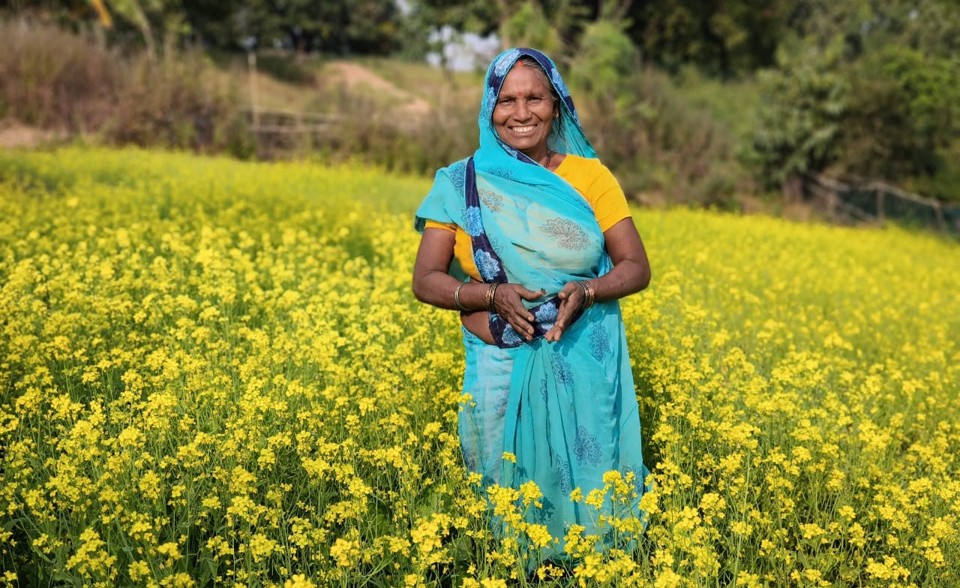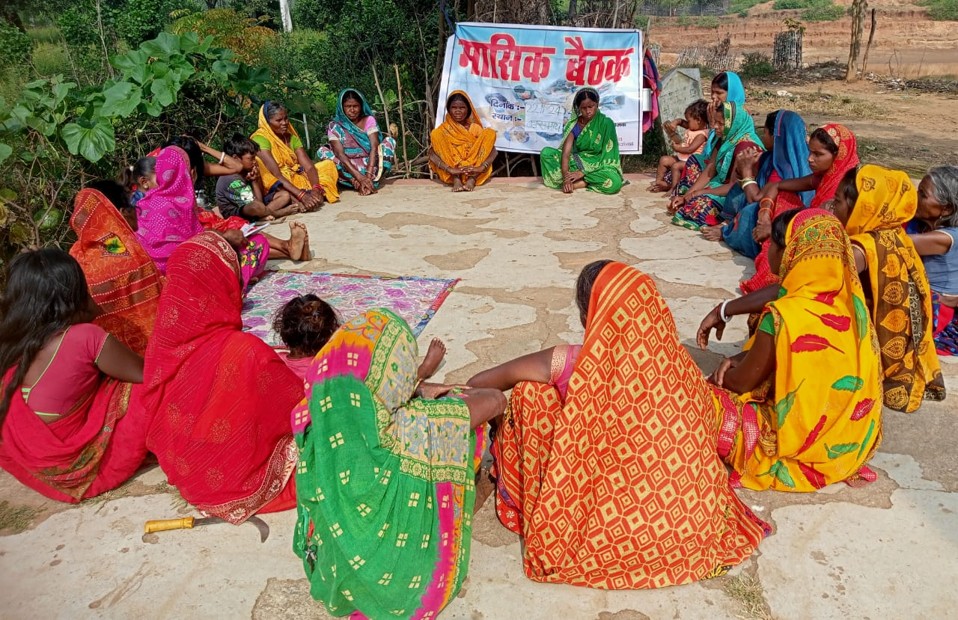
About the Together Women Rise Grants Program
The Together Women Rise Grants Program has two key components that support our overall mission to achieve global gender equality. Featured Grants are largely focused on delivering direct services by funding grassroots organizations that empower and support women and girls in low-income and marginalized communities in the Global South. Our Transformation Partnerships are designed to invest in areas where we can make the biggest impact on achieving global gender equality by addressing the root causes of gender inequality.
Through our Featured Grants Program, we highlight a different organization/project each month, providing a variety of learning materials on the issue and how the grant will be used. Through the Featured Grants program, we support capacity building, new programs, or expansion of existing programs. The following is information on the grant we are featuring for April 2025.
The Global Issue
Enhancing Women’s Health and Economic Independence
| “India may be the world’s second largest producer of food, but it has its second largest undernourished population. Further, more than half of women in India suffer from anemia, which is one of the reasons for the high rate of low birthweight babies. An unbalanced diet and lack of food is directly linked to high rates of stunting, excessive weight, and death in children under five years of age.” – Shoba Suri, Observer Research Foundation |
Although most of the world’s undernourished live in the Global South, malnutrition affects every country in the world and occurs in many forms. These include undernutrition (wasting, stunting, and underweight), inadequate vitamins or minerals, and overweight and obesity. Many of these conditions are inextricably linked with poverty and result in diet-related, noncommunicable diseases that have a developmental, economic, social, and medical impact on individuals, their families, and entire countries. Women are at higher risk of food insecurity than men in every area of the world. There are many factors in this, such as the local culture where this month’s grantee serves, which dictates that men eat first and receive larger helpings of nutritional food.
Micronutrient deficiencies are among the most common forms of malnutrition. These include calcium, iron, and vitamins C and E. Micronutrient deficiencies can have serious consequences, including adverse pregnancy outcomes, blindness, and greater susceptibility to infectious diseases.
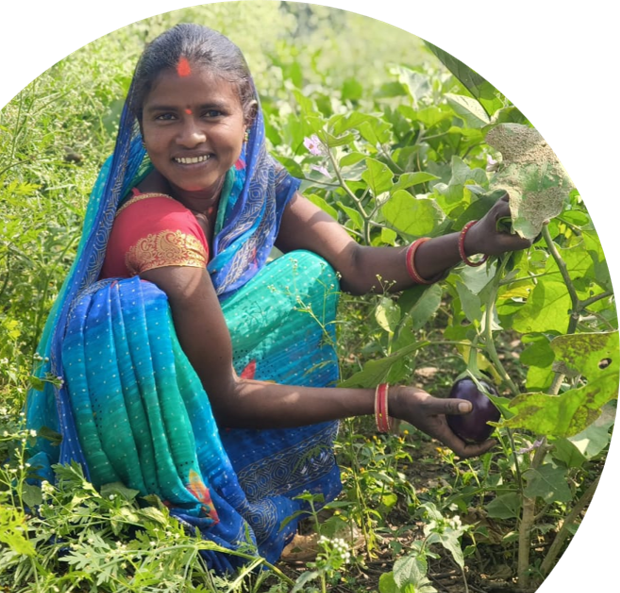 Adding to the burden of food insecurity, climate change is hitting the world’s most vulnerable people hardest and erasing years of progress on child undernutrition.
Adding to the burden of food insecurity, climate change is hitting the world’s most vulnerable people hardest and erasing years of progress on child undernutrition.
- Globally, there are 2.5 billion overweight adults and 890 million obese adults.
- 149 million children under 5 are stunted (too short). The incidence has declined from 40% in 1990 to 22% in 2022, but it has plateaued in the past several years.
- 45 million children under 5 are wasted (too thin).
- 50% of child deaths are linked to hunger, mostly in low and middle-income countries.
- 37 million children are overweight or obese.
- 50% of children under 5 suffer from vitamin and mineral deficiencies.
For many families, the solution is just outside their door. Many studies and projects around the world show that backyard gardens can help improve the livelihoods and health of women and their families, especially when they can sell their excess produce to others. A review of data on maternal and child undernutrition and survival from 36 countries has suggested dietary diversification, including home gardening, as an effective strategy to improve nutrition. When women can grow food at home, it can change the course of their lives and those of their children.
| In 2023, 47 million people living in 18 million U.S. households were considered food insecure. This represented 14% of all households, an increase of a million households compared to 2022. Among U.S. households with children under age 18, just over 82% (29.7 million) of households with children were food secure in 2023. |
About Our Grantee
Together Women Rise is funding a $48,000 Featured Grant to Asia Initiatives. This is a project grant that will fund organic backyard gardens in rural Northern India.
ASIA INITIATIVES
Asia Initiatives is focused on economic development and gender equity, especially for women and their families. Asia Initiatives uses Social Capital Credits (SoCCs), an innovative developmental platform, to incentivize acts of social good, such as caring for community spaces, planting kitchen gardens, etc., in exchange for goods and services, such as agricultural skill development, access to crops, and equipment.
Asia Initiatives empowers women to realize their full potential and become key stakeholders of their own success. Its work is based on co-founder Dr. Geeta Mehta’s reinterpretation of the Chinese proverb, “Give a man a fish and you feed him for a day; teach a man to fish and you feed him for a lifetime.” Asia Initiatives has worked in over 20 locations across India, Kenya, Ghana, and the United States. Its record of accomplishments demonstrates a strong commitment to promoting gender equality. Through targeted interventions in education, healthcare, and economic empowerment, Asia Initiatives empowers more than 50,000 women and girls across Asia every year.
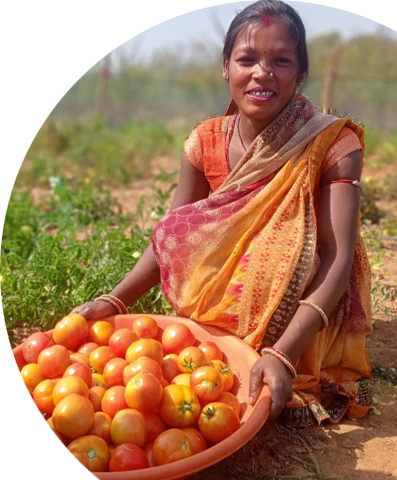 The Social Capital Credits (SoCCs) model encourages acts of social good without having to rely on money. It was developed by Asia Initiatives to tackle the endemic issue of poverty while simultaneously promoting the building of community spirit. SoCCs enable each development dollar to have a multiplier impact, since community members earn their personal good, such as education, by doing a social good such as planting trees. These good deeds are decided upon by the women themselves during SoCCratic Dialogues at the start of each project. SoCCs can be spent on items like education, upskilling, healthcare, microloans, or other types of support chosen by participants. SoCCs are based on an Earning Menu, which is a list of specific activities developed by the participants in the community. By doing them, a pre-determined number of credits can be earned through the Redemption Menu. Asia Initiatives’ SoCCs app and web platform record and analyze all SoCC transactions to ensure that the women are making progress toward the goals that they have set for themselves.
The Social Capital Credits (SoCCs) model encourages acts of social good without having to rely on money. It was developed by Asia Initiatives to tackle the endemic issue of poverty while simultaneously promoting the building of community spirit. SoCCs enable each development dollar to have a multiplier impact, since community members earn their personal good, such as education, by doing a social good such as planting trees. These good deeds are decided upon by the women themselves during SoCCratic Dialogues at the start of each project. SoCCs can be spent on items like education, upskilling, healthcare, microloans, or other types of support chosen by participants. SoCCs are based on an Earning Menu, which is a list of specific activities developed by the participants in the community. By doing them, a pre-determined number of credits can be earned through the Redemption Menu. Asia Initiatives’ SoCCs app and web platform record and analyze all SoCC transactions to ensure that the women are making progress toward the goals that they have set for themselves.
SoCCs received Fast Company’s “World Changing Idea Award” in 2020. Asia Initiatives has also won awards from MIT SOLVE, General Motors, Vodafone, Experian, and the Jacobs Foundation. United Nations Secretary-General Ban Ki-moon said, “I appreciate and commend the hard work of Asia Initiatives in prioritizing and enhancing the role of women in addressing the Global Development Agenda.”
Asia Initiatives was a Together Women Rise Featured Grantee in 2018. That project promoted sustainable development and a sense of independence and strong community among women in Shohratgarh, India. The women were trained in poultry farming, which improved nutrition for themselves and their families, and they received training in record keeping and financial literacy.
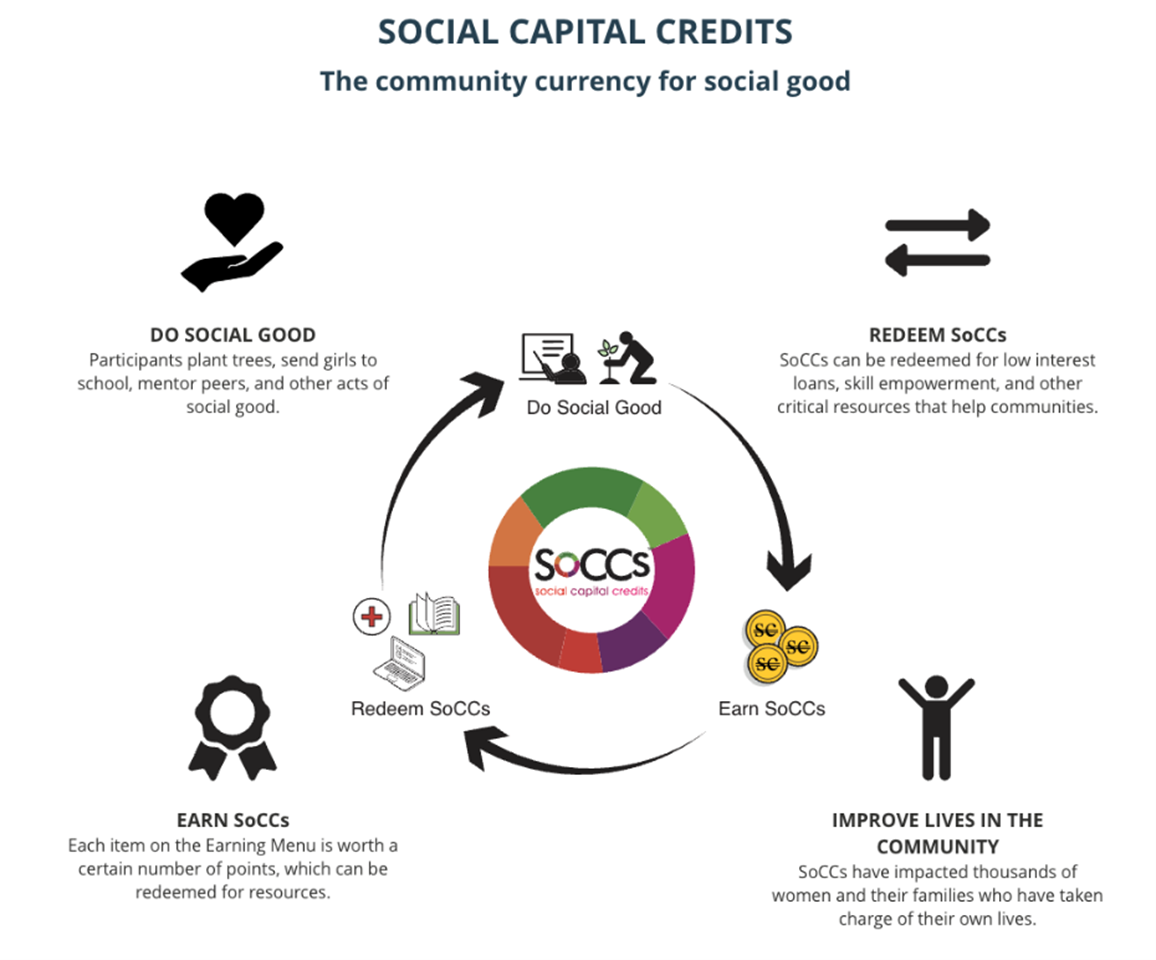
LEARN MORE ABOUT ASIA INITIATIVES.
Life Challenges of the Women & Girls Served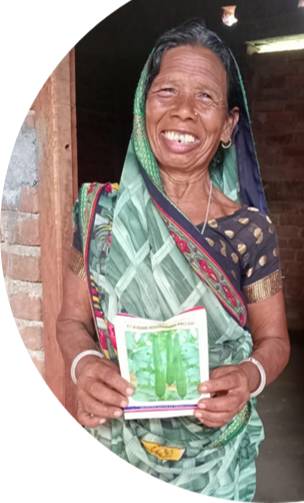
Most women in India have access to food, but the majority suffer from micronutrient deficiencies. In the rural and tribal geographies of Northern India, most people eat a predominantly vegetarian diet of grains like rice, wheat, and lentils. This diet often lacks adequate protein, fruits, and vegetables. It also contributes to widespread deficiencies, with nearly 50% of the female population suffering from anemia. The resulting health issues affect the wellbeing of women and their families, contributing to a high rate of low birthweight babies and childhood health problems. Severe malnutrition can also lead to physical and mental stunting, perpetuating intergenerational poverty.
In addition to nutritional deficiencies, women in India face systemic marginalization throughout their lives. This mistreatment begins in childhood when they are considered less desirable than boys and continues relentlessly as they are consistently viewed as inferior to men. The issues faced by women and girls in India include:
- Gender inequality – Discrimination and stereotyping against women and girls in India is rampant, thanks to a deeply entrenched patriarchal mindset.
- Deep poverty – 360 million people – more than every U.S. man, woman, and child – live in squalid conditions and are among the most impoverished in the world.
- Female feticide – Selective abortion of female fetuses kills approximately one million girls in India every year. This is a common practice due to economics, as parents see girls as burdens and cannot fathom the idea of having to pay a dowry to a future bridegroom.
- Gender-based violence – Many frequent and severe incidents of sexual harassment and assault are reported each year in India. One out of four women report having experienced physical violence from a spouse. At least two women are sexually assaulted every hour, and every six hours a young married woman is beaten to death, burned, or dies by suicide, according to an analysis of 2014 statistics from India’s National Crime Records Bureau. In recent years, reports of crimes against women are increasing dramatically. (Worldwide, a woman is killed every 10 minutes.)
- High incidence of non-communicable diseases (NCD) – The NCD crisis in India is one of the most significant health and development challenges of the century. NCDs, such as cardiovascular disease and diabetes, cause a financial burden for individuals and families due to the high cost of treatment and the loss of stable employment.
- Unequal distribution of education – India has more than 35 million children without access to school, of which 53% are girls. These girls are at risk of early marriage, early pregnancy, trafficking, violence, and poverty. India also has a high drop-out rate for girls – as high as 57% in some areas.
- Unequal pay – Men earn 82% of the labor income in India, leaving just 18% for women. The pay gap widens as women move up the career ladder.
- Sex trafficking – This is an international human rights crisis and India is an epicenter of the problem, with an estimated 18 million of the world’s enslaved population.
- Child marriage – One out of three girls in India is married before the age of 18. Child marriage interrupts schooling and limits a girl’s opportunities throughout her life. More than 7,200 children report rapes in India each year. Among these, victims who do report the assaults often suffer mistreatment and humiliation from the police.
LEARN MORE ABOUT INDIA.
How the Grant Will be Used
Together Women Rise will fund supplies and training for organic backyard gardens for 450 women in remote villages, improving nutrition and incomes for the women, their families, and their communities.
Asia Initiatives’ projects are conducted with local partners who know the local people, language, customs, and social hurdles for women. For this project, Asia Initiatives will work with Savera Foundation, a partner organization since 2021. This partnership includes training local SoCC managers and women participants, SoCCratic dialogues, data collection, and analysis of all SoCCs earning and redeeming activities.
The project aims to increase health using sustainable, climate friendly gardens.
Participants receive:
- vegetable seeds
- kitchen garden tools
- composting starter kits
- workshops on organic kitchen garden planting and maintenance
- composting workshops
- training on building bamboo supports for garden protection
- sessions on sorting, packaging and marketing vegetables locally, in wholesale markets, and connecting to larger supply chains.
All participating women are tribal forest-dwellers with rich Indigenous knowledge of cultivating wild vegetables. Asia Initiatives aims to leverage this Indigenous knowledge to both preserve and enhance it further to protect the native species and biodiversity in the area.
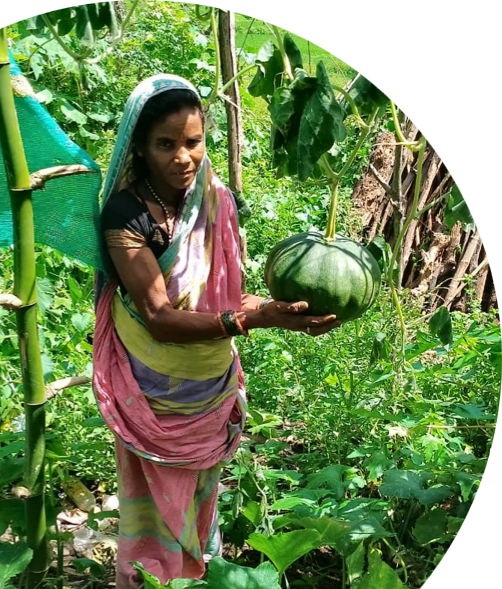 Training sessions are held during the first 25 days of the project, with refresher sessions scheduled quarterly thereafter. Training is organized in 15 groups of 30 women each. Resource persons will guide participants in preparing jeevamrut (natural liquid fertilizer), dasha parni arka (organic pest repellent), and in the techniques of seed planting and spacing, including optimal placement of vegetables based on available space.
Training sessions are held during the first 25 days of the project, with refresher sessions scheduled quarterly thereafter. Training is organized in 15 groups of 30 women each. Resource persons will guide participants in preparing jeevamrut (natural liquid fertilizer), dasha parni arka (organic pest repellent), and in the techniques of seed planting and spacing, including optimal placement of vegetables based on available space.
Women will not only work directly in their gardens but also build bird perches and grow trees around their gardens to utilize birds as natural pest control and to increase biodiversity. They will also cultivate Moringa, the superfood that has helped cure anemia for many women in Asia Initiatives’ projects. Additionally, women will be able to sell their produce and Moringa powder to increase their income and help combat nutritional deficiencies throughout the community.
The project aims to increase economic independence through SoCCs activities.
Women earn SoCCs for the following activities, which they will redeem for all the supplies and training listed above, reinforcing the multiplier effect of the project:
- Activating the Village Health and Nutrition Committee, a local body formed by the government that is inactive in most villages – Women will earn SoCCs for attending these local government meetings and advocating for their health and nutrition needs.
- Preparing and throwing seed balls in forests – The seed balls have a dual purpose: regenerating forests and providing food for animals in the forest to prevent them from entering village areas and destroying kitchen gardens.
- Maintaining cleanliness in common areas, especially around water sources, to help prevent the spread of communicable diseases.
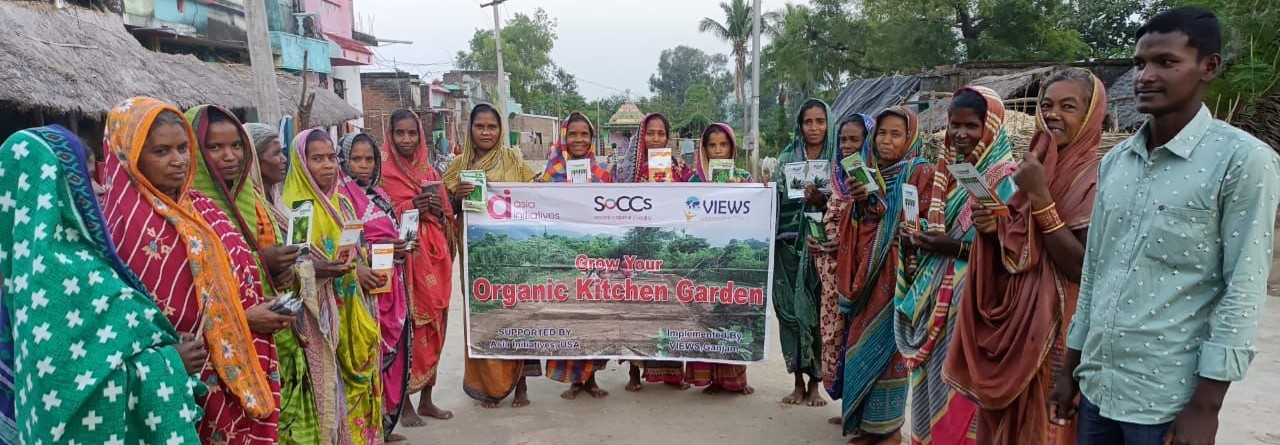
This project aims to improve the health and financial wellbeing of each participant, plus many more as the ripple effect widens. Anticipated outcomes include:
- Increased income – Asia Initiatives anticipates a 150% to 250% increase in the participants’ incomes.
- Enhanced food diversity – Increased access to fresh, nutritious vegetables grown locally, leading to improved dietary diversity and reduced reliance on external food sources. Prior efforts with the Savera Foundation led to over 200 kg of vegetables being planted, with 150 kg being sold for extra income.
- Healthier community – After the consumption of vegetables in prior projects with the Savera Foundation, the malnutrition rate of women and children significantly dropped in each village.
- Economic benefits – Includes reduced grocery expenses and potential income from selling surplus produce at local markets.
- Community engagement – Strengthened community bonds through shared learning experiences and collaborative activities.
- Environmental benefits – Includes organic compost production.
IMPACT – Direct: 450 women; Indirect: 2,000 women and girls
Budget
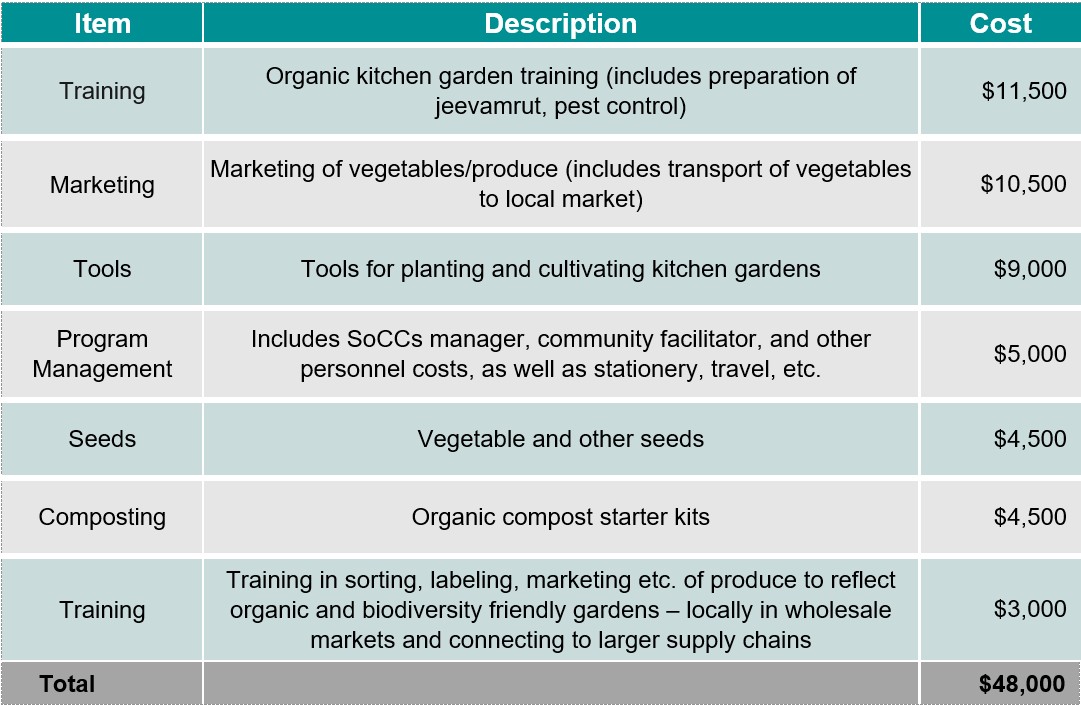
Why We Love This Project/Organization
We love the large impact and drastic increase in income for women who participate. Gardens support health and nutrition but also make an impact on the ecosystem. We also love the innovative use of Social Capital Credits as a means of community building and economic benefit.
Impact Story
MEET PARVATI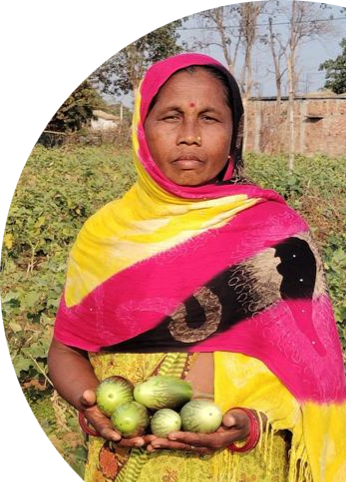
Parvati is a 43-year-old mother of two. Five years ago, Parvati, along with 80% of the women and children in her village, suffered from anemia and malnutrition due to poverty and a lack of access to healthy foods. Parvati made a living by walking four kilometers each way to collect firewood from the jungle. She would then sell this wood in the market, earning less than a dollar a day.
Like many other women in the village, Parvati would also collect and sell mica scraps in dangerous, unregulated mines. Exposure to and handling of mica presented serious health risks for many of these women.
In 2021, Asia Initiatives began an Organic Backyard Gardens program with a local partner, the Savera Foundation. After meeting with Parvati and after hearing her story, staff members were struck by her resilience and determination to care for her family, despite the dangerous and exhausting work she had been doing for years.
Beyond her commitment to supporting her family, Parvati also plays an active role in supporting her community and being a voice for them in times of need. She spent years helping her village successfully lobby for the construction of a proper road with better access to essential services such as the hospital and local markets.
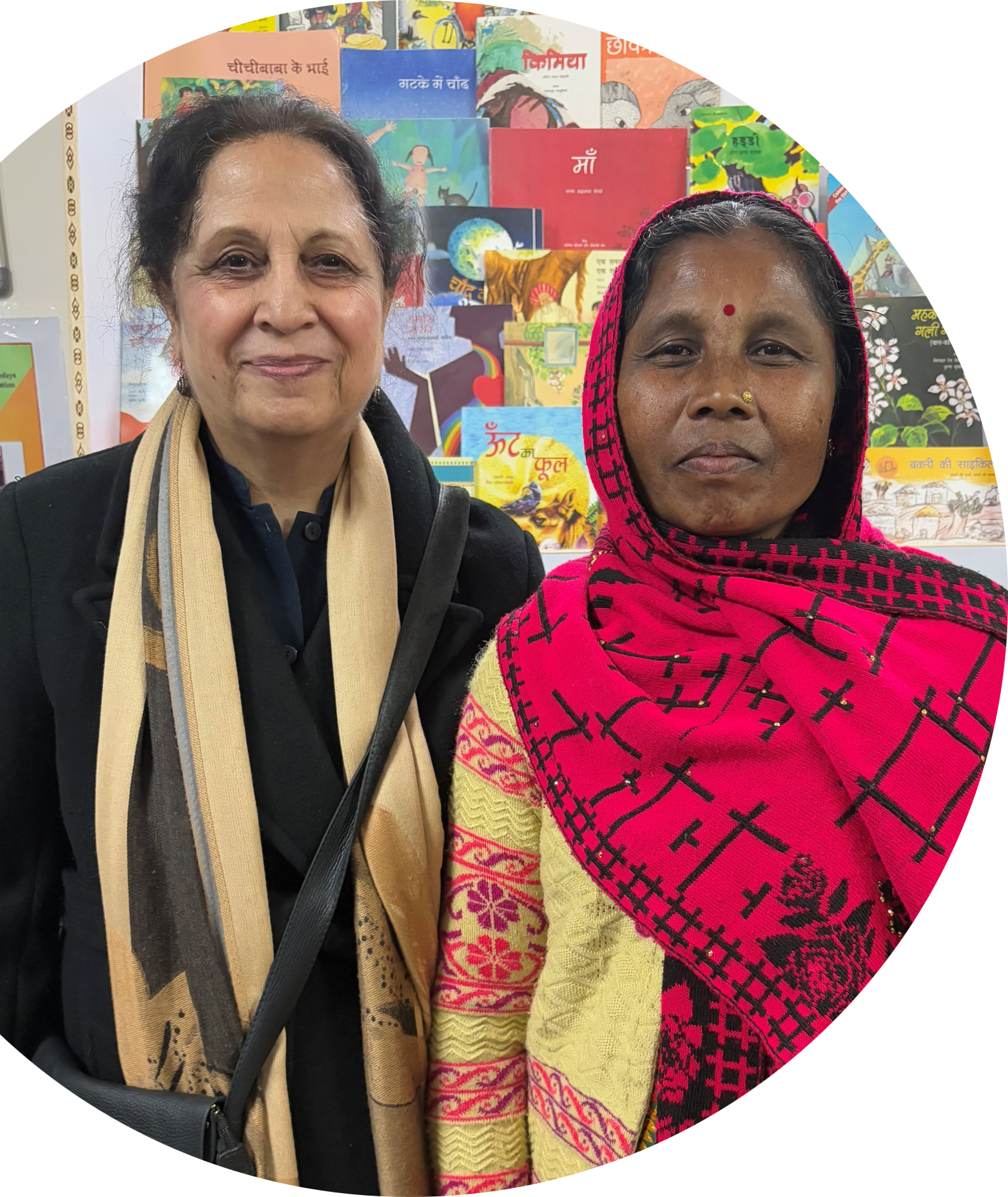 Parvati started her backyard garden by planting fruit trees, preparing seed banks, and attending monthly meetings with her Self-Help Group. In return for completing these activities, she earned additional seed packs, gardening equipment and tools, and organic compost starter kits. Through workshops, training sessions, and consistent follow-ups, she gained the skills to successfully manage her garden.
Parvati started her backyard garden by planting fruit trees, preparing seed banks, and attending monthly meetings with her Self-Help Group. In return for completing these activities, she earned additional seed packs, gardening equipment and tools, and organic compost starter kits. Through workshops, training sessions, and consistent follow-ups, she gained the skills to successfully manage her garden.
What began as a means to address immediate food and income needs evolved into something far more powerful: Parvati reclaimed her agency and independence. Today, her garden not only provides healthy food for her family but also generates income that has drastically improved their quality of life. Parvati continues to act as a leader in her community by empowering and supporting other women, attending community gatherings, and creating a public library space in her home for children in her village to use in their free time.
| “My strength is not measured by the weight of the wood I carried, but by the courage to take a step toward a brighter future for my children.” – Parvati |
Learn More
Shop! Watch! Read! Listen!
Proven Platter
Recipes
Source Materials
Asia Initiatives
CDC: Nutrition
Challenges Faced by Women in India
Female Feticide in India
Harvard School of Public Health
Indian females in the twenty-first century: how they have fared? An analysis using geospatial techniques
National Crime Bureau
Observer Research Foundation
Reuters: US AID funding halt
The Deccan Herald
The Hindu Businessline
Times of India
USDA Economic Research Service
UN News: US AID cuts
UN Women
UNICEF
Violence against women in India: Comprehensive care for survivors
World Bank
World Health Organization
World Vision
Glossary
Non-communicable diseases (NCD): Also known as chronic diseases, tend to be of long duration and are the result of a combination of genetic, physiological, environmental and behavioral factors. The main types of NCDs are cardiovascular diseases (such as heart attacks and stroke), cancers, chronic respiratory diseases (such as chronic obstructive pulmonary disease and asthma) and diabetes. (Source: World Health Organization)
Social Capital Credits (SoCCs): Innovative developmental platform that incentivizes acts of social good, such as caring for community spaces, planting kitchen gardens, etc., in exchange for goods and services such as agricultural skill development, access to crops, and equipment.
The Global South: The Global South includes the countries that experience higher levels of poverty, income inequality, lower life expectancy, and harsh living conditions compared to the wealthier nations in the “Global North” – located mostly in North America and Europe. The Global South primarily includes many of the countries in Africa, Latin America, the Caribbean, Asia and the Pacific, and the Middle East.
